On Tuesday 29th November AREF held its first event dedicated to the very important topic of Diversity, Equality (or Equity as some now prefer) and Inclusion. It was held in-person at a hotel in the City and was sponsored by PGIM Real Estate.
This was the first event organised by AREF's new DE&I Taskforce which was set-up last year in 2021, with the Taskforce’s primary objective being to raise awareness to AREF members and the wider industry of the importance of DE&I within their firms.
The event started with Andrew Grigson of PGIM Real Estate & Co-Chair of AREF's DE&I Taskforce giving a welcome to the event.
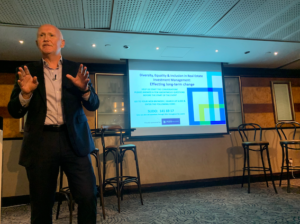
Kevin Aitchison, CEO of Knight Frank Investment Management and moderator for the event began by setting the scene with why DE&I was important to him. Having spent 10 years being heavily involved with Wheelchair Rugby (and indeed receiving an MBE for his efforts here), he asked the audience to raise their hands to see if any of them had indeed worked with anyone in a wheelchair before – a few people surprisingly did raise their hands but when drilled down to ‘was this whilst working in real estate’ only two were left with their hand up, out of around 70 people.
Kevin moved onto the objective of the afternoon, which was for everyone in the room to walk away thinking 'what can I/my organisation do to help’ – ultimately he said, this is a long term objective, it’s a journey, but we all need to start on that journey, because, if a business has a more diverse workforce, the better ideas and entrepreneurism will lead to those organisations being more successful in the future.
Kevin showed some stats from a recent survey of AREF member firms, carried out by AREF’s DE&I Taskforce, there were some surprises and some that were less so, as can be seen from the slide pack which can be downloaded here. Some key points included:
- 97% of respondent firms offered insight days or work experience – good news.
- Over 64% of firms offered trainee/apprenticeship programmes – not so great, 36% do not offer any.
- 62% offered a school outreach programme but out of those only 3.5% focused on primary schools, with the majority, 39% focusing on six form/college. Kevin felt that most kids of 16+ had probably already made up their minds about their future careers so maybe we should be focussing our efforts more on primary schools?
- 74% of firms offered a returner programme (i.e. those who have taken a career break, due to maternity or caring for a sick relative), however, only 13% offered an ex-armed forces programme.
AREF ran a short audience survey for those attending the event, with 67 people answering a few questions. Highlights included:
- Did you have free school meals? - Only 6% of the room did. This tells a story and wouldn’t it be great Kevin stated, if in 10 years time this figure is much much higher!?
- Another question asked ‘did you go to university?’ – with only 15% of the room answering as having not been at university – again, why is that the case? Many jobs within our industry do not require a degree – are businesses insisting on this? Maybe that’s a first step towards change.
- Another question asked about work experience and how was it obtained - surprisingly only 34% were obtained through friends and family. This is positive, as historically, the majority in real estate either got to know about it or even gained entry through friends and family – which isn’t a bad thing, but we need to increase the other ways!
Kevin also mentioned that the EGi ran an annual EG Race Diversity Survey (link), and in 2021 it made for shocking reading and confirmed that sadly, racism clearly exists within the sector, with 84% of ethnic minority respondents believing that racism is an issue; 75% had experienced racism and over 70% of ethnic minority respondents believed that the property industry is not genuinely trying to increase representation.
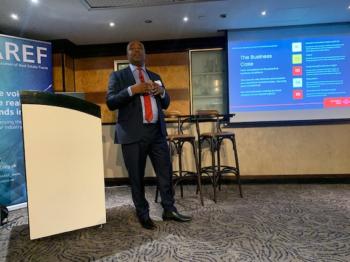
Up next was our keynote speaker ‘Nero Ughwujabo, Senior Strategy Advisor on EDI at The Princes Trust Group and former special adviser to 10 Downing Street’.
Nero began with saying that effecting long term challenge is a systemic change, this isn’t going to happen overnight. Whilst working at No. 10 Downing Street, he worked on a Race Disparity Audit and one of the key stats was ‘if you are a young black man, you are four times likely to be unemployed’ – this said Nero, is significant and needs to change across all organisations and industries.
Nero talked about the 'Equality Act 2010', as all organisations are operating under this legislation, with a) a duty to eliminate discrimination and b) positive action in service provision. This covers all diversities including age; disability; gender reassignment; race; religion or belief; sex (gender); sexual orientation; pregnancy & maternity; marriage and civil partnership. Nero also mentioned the global focus on ED&I recently was mainly due to Covid, the Black Lives Matter movement and issues around access to capital.
Nero talked a lot about the journey we are all on and emphasised how AREF members can really drive change, with the main drivers being ‘Customers, Clients & Talent’. However, he said, firstly, it’s important for firms to put their own ‘house in order’ and do the right things internally and drive effective EDI strategies internally to help strengthen your external voice.
Nero talked about his work at The Prince’s Trust, where they have set their ambition to be ‘one of the most equal, diverse and inclusive organisations serving young people’. To do this they have set clear targets around broadening reach, representation, belonging and progress. They are working on building a workforce that is as diverse as the communities they serve and providing a culture that supports them fully, setting up several mentoring programmes and strong EDI networks as well as measuring and tracking their progress along the way so they are accountable against their targets.
Nero went onto say that the key to EDI success in a business is for the senior leadership to take control and not for HR departments to lead on the initiatives. Everyone in a business has a role to play and leadership must focus on building an inclusive culture. They need to set targets, collect data and everyone should be held accountable.
Nero was then joined on stage by the panellists.
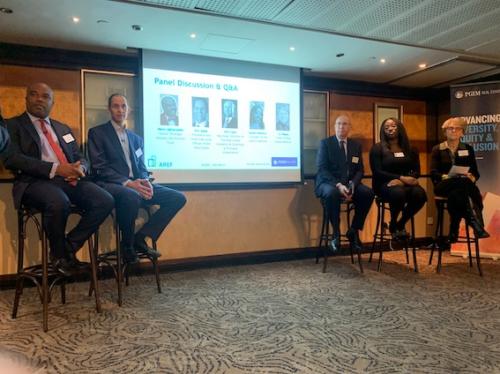
Liz Peace, Chair of Real Estate Balance (REB). Liz, along with seven other women in real estate founded REB seven years ago, when few women sat at senior level in the real estate industry. She feels the industry is good at attracting women, especially at a younger level, but she said, we seem to lose them at middle management so there’s no pool for senior level. REB recently ran a survey and the numbers confirmed this, with around 45% of middle management being women but only 20% at c-suite level. It appears that the culture puts women and other diversities off. Liz feels things are changing, but not at a fast enough pace. REB are now looking at other diversities and working with others including Black Professionals in Construction, they are looking at social diversity and working out how we get more of these people into the industry.
Sarah Hayford, founder of the Land Collective (LC). The LC is a not-for-profit organisation, which aims to get more young people from diverse backgrounds into the property sector. LC offer employability schemes, programmes, events and a host of resources to improve their sector awareness. They mainly work with university/grad level but also work with schools and people referral units for those who have been kicked out of school. All events and resources are free. Sarah had issues herself breaking into the industry and felt it was a very secretive industry so it’s very close to her heart. She feels it’s still an issue.
Phil Clark, Chair the Real Assets Academy. The Academy was set up as they realised there’s a lot of roles in real estate, some of which you don’t need a degree for, so they look to connect schools with the industry and focus on schools with the lowest social mobility. They bring awareness of the industry by offering various apprenticeships etc – so no matter what your skill set is, there’s something for everyone.
Eric Adler, CEO of PGIM Real Estate. PGIM have 35 offices around the world and he finds DE&I different in each country, with each one having its own history and rules etc, which is a challenge but also an opportunity as he can see what works in other parts of the world. He feels that the UK have a strong angle in social progression and we are trying to change things the most.
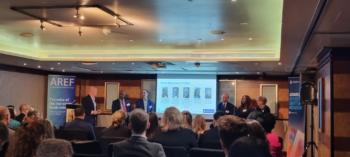
Kevin opened up the floor to questions. One person asked about the good practice in the listed sector as there are now requirements for 40% of Boards to be women and if the panel felt that the equivalent should apply to the unlisted sector? Eric replied to say that he wasn’t exactly sure how the regulation would work, however, a lot of investors in all industries are forcing the same type of approach that the listed sector is doing in a more formal way, which is good for those businesses who do not have DE&I at the forefront. Liz also replied that the women on boards rule was good but she feels it’s just a tick box for firms and the real issue is getting a better balance in all diversities on that senior exec / board level. Phil feels it’s like climate change and we should have a legislative requirement and an obligation on all employers to consider this. We shouldn’t just leave it to employers to have good practice.
Another question from the audience asked - how can businesses create a system to make themselves more attractive for different diversities to stay for a sustainable period of time, which would help organisations in the longer run? The panel agreed that you need to start with a pipeline, as this is a long-term project – businesses need to nurture their staff so they want to stay. Phil agreed it’s a long-term cultural shift in society and in employment in general, it’s not just a top-down or bottom-up approach, it’s both. However, there are limitations as most businesses in the country are SME’s with less than 5 people, so it’s hard to set a quota. However, firms need to be conscious of diversity in their selection process and be as inclusive as they can. Liz mentioned that in a recent survey, it appears that there’s still aggressive commentary in an organisation and that means people leave – how do we change the culture of these firms?
Eric mentioned that at PGIM they are pretty good at bringing in diverse talent, they’ve all had the unconscious bias training and work with blind CV’s etc, however, it’s about ‘inclusion’ now and keeping those members of staff so this is what they are focusing on. Lots of people have blind spots and do not realise they’re doing anything wrong. It takes time, years even to change that.
Sarah mentioned that the Land Collective works in partnership with lots of firms to guide them in hiring their interns and work experience people.
Another question mentioned how there are no GCSE’s or A-levels in this country to get into real estate but there is in Wales. He went onto say that there are only 1% of women working on building sites. He felt the real estate investment side of the industry was doing quite well in comparison.
Finally, Kevin asked for final thoughts from the panel on what people should be thinking about and what they should be doing:
Nero reiterated what he said earlier, that leaders need to commit to change. It’s a process of learning, however, some people are afraid of change and think they don’t know enough about it so they’re quiet about it. They need to take practical steps and ‘start something’ (the Prince's Trust strap line).
Eric said that businesses need to focus on inclusion as it equals retention – retain the juniors and you’ll solve the problem and also look at all your stakeholders to see what the other parties are doing in this area, i.e. builders/agents/contractors etc – what are they all doing?
Sarah mentioned that people need to make new staff members/interns etc feel safe so they thrive in the workplace. If you see a grad/intern, make them feel welcome, include them. Quite often they age-out of that. We all have a role to play in this.
Phil would like everyone to raise awareness in their own school communities, encourage the teachers to get involved. The Academy has an essay competition coming up and it would be great to get more schools involved.
Liz feels that there are lots of organisations doing some great things and her hope is that somehow, we collectively tackle the image of the industry which will then retain people at all levels. Let’s come together to promote what the industry can offer to a much broader basis.
Kevin finished the session by saying that he hoped the audience enjoyed the session and that it had peaked a bit of interest as well as thoughts about what we can all do. Ultimately, the message is, it’s a long journey but a journey we all need to start.
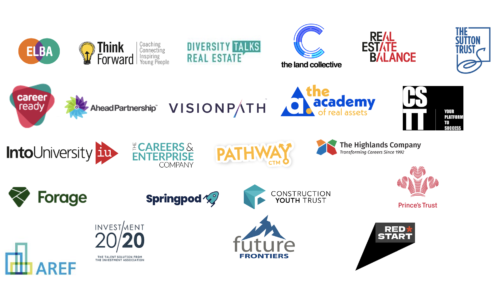
AREF collected, through a member survey, the names and details of around 20 organisations working in this field who already help many of our member firms (download logos and links here). We’d encourage members to reach out to these firms, as everyone needs to start somewhere to create the change.
Kevin thanked Nero and all the panellists and AREF for bringing the event together.

Proudly sponsored by:


